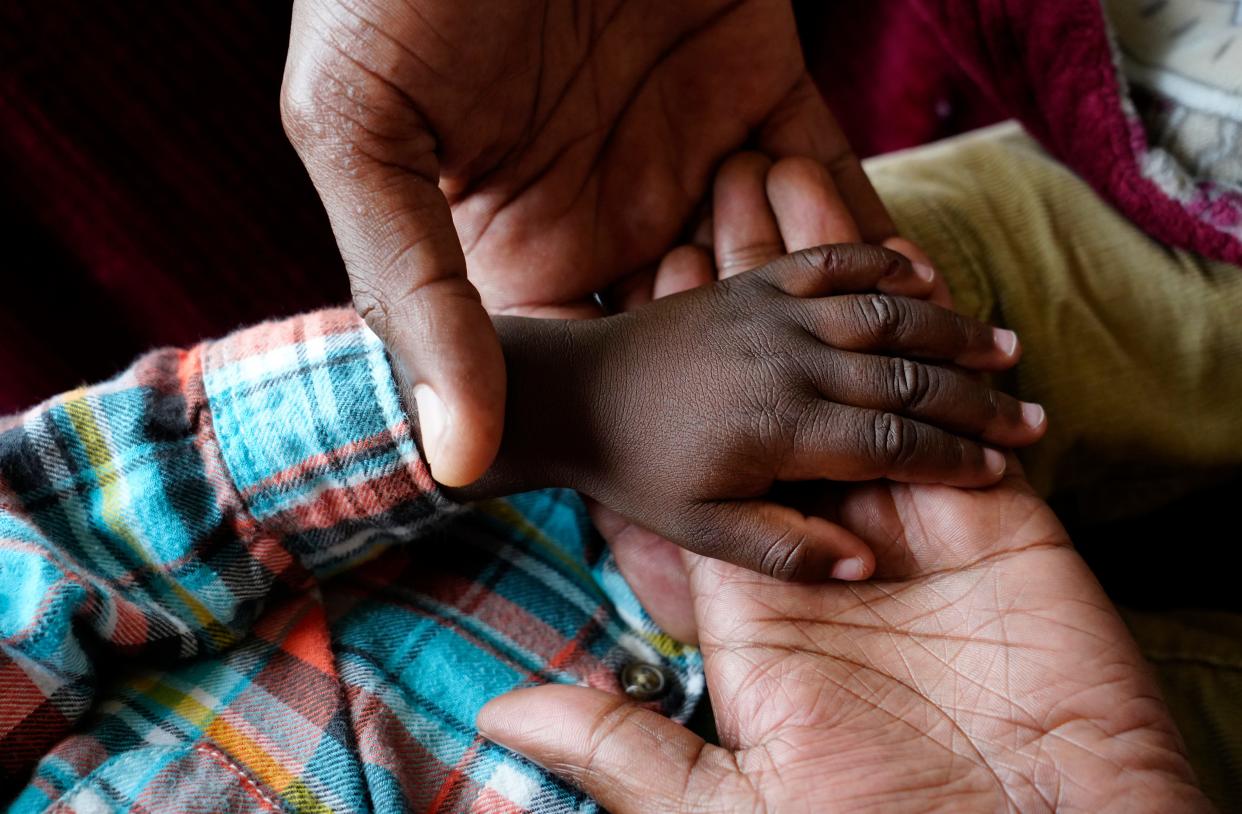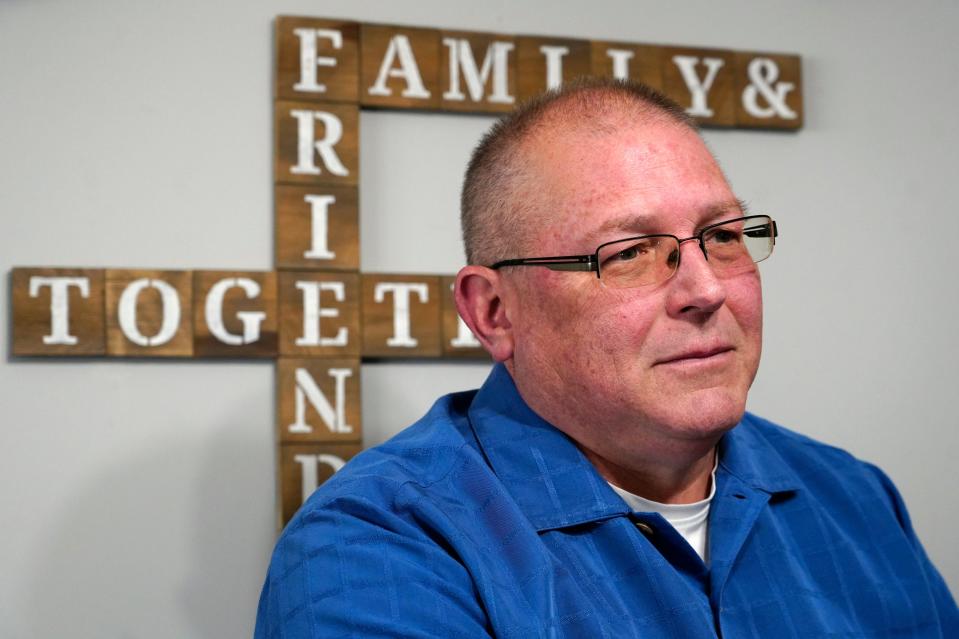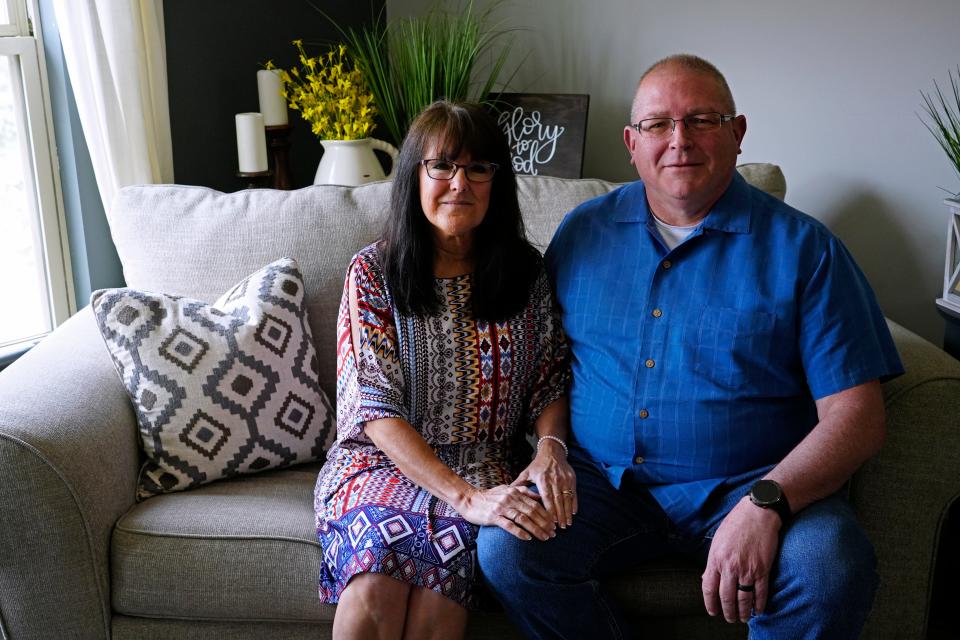'I felt led by God.' A Greater Cincinnati church saves a family from Haiti's terrors

- Oops!Something went wrong.Please try again later.
Roben and Tatou don't have to worry about a Haitian gang storming their duplex in Lebanon, a small town north of Cincinnati.
But the sound of a motorcycle or fireworks brings back the terror they tried to leave behind in their native Haiti.
To the Haitian refugees, it's the sound of the motorcycle-riding gangs they narrowly escaped a month earlier, gangs that kidnapped and killed Tatou's cousin by setting him on fire.
"When we heard that too much motorcycle – vroom! vroom! vroom – the gang is coming," Roben said. "When the gang is coming, they can just come in. ... They can take the money, you know, kidnap, kill. They do a lot of chaos."
They now live a peaceful new life in the suburbs of Cincinnati with their 18-month-old son, Lewens, attending Reds games, enjoying ice cream and taking in parades.
A group of Cincinnatians, including a local church and a member of Congress, made this new life possible.
Family grateful for friends in Cincinnati
The Enquirer agreed not to use the couple's real names, since they were fearful criminals would ransom their remaining family should they learn that they have relatives in the United States.
But they want people to know the horror happening in their homeland. And they want people to know their story.
It's a story that starts with the violence in the wake of the assassination of Haiti's president in 2021. It ends with salvation through a Cincinnati-area church pastor who wanted to save a friend, a daring armed rescue by a group of ex-military and police personnel and the intercession of a local congressman.
Rep. Greg Landsman, a Democrat from Mount Washington who represents Cincinnati and nearby Warren County, lobbied the United States Citizenship and Immigration Services to help bring the family to the U.S. Landsman praised the local church for bringing their plight to his attention.
"There's so much power in what individual people can do," Landsman said. "You can’t always solve the larger issue. It doesn’t mean you can’t have a big impact. The impact they've had on this family’s life is beyond words."
Haitians afraid to leave their homes
Roben and his family are three of the more than 100,000 immigrants in the past year to enter the U.S. through a humanitarian "parole" program intended to provide refuge for people fleeing crises in Venezuela, Haiti, Nicaragua and Cuba.
And there are many crises in Haiti to flee from.
Haitians are afraid to leave their homes. Trucks cannot deliver goods amid the increased violence, leading to starvation after an assassin shot President Jovenel Moïse on July 7, 2021, according to news reports. The police and military have struggled to control the more than 200 warring gangs that have spread across Haitian cities and towns. On top of that, a catastrophic flood in early June killed 42 people.
Roben, 39, sat recently in the living room of Doug Sibcy, pastor of G3 Community Church in Lebanon, and recounted his family's harrowing escape from Haiti and how Sibcy brought him to the Cincinnati region. His son slept soundly under a quilt on a recliner nearby. Tatou, 28, looked on from a couch.
Roben can speak English and had worked as a translator in Haiti. His wife speaks their native Haitian Creole language.
The serene scene and Roben's easy grin belie their horrific experience a few weeks earlier.
'When they kill you, they put fire on you'
In March, armed men broke into their home, fired guns into the ceiling and tried to kidnap them. Tatou was at work. Roben, who heard them coming, took his son and hid in a neighbor's house.
"When they kill you, they put fire on you," Roben said. "When they kidnap you, they can ask for money. You know. If your parents cannot give that ransom, they can kill you."
Murder, rape, lynching and kidnappings have more than doubled in the first quarter of 2023 compared to a year earlier, the United Nations and Haitian police reported.
The gangs pay for their operations through extortion and ransom. They use sexual violence and massacres to intimidate.
A house riddled with bullets
Roben, Tatou and Lewens escaped that fate because Roben heard the motorcycles before he went home. It was a Saturday. Tatou was at work at a pharmacy in their home of Fort Jacques just outside Port-au-Prince. Roben had run an errand with his son.
He never went back to his house. He took his son to a neighbor's house.
Photos of his house taken by his friends show it was riddled with bullets. The gang had shot the ceiling and the windows. They tried unsuccessfully to steal his car. They had come to kidnap and ransom them, Roben said.
A friend 'won't rest until we get them home'
That night, Roben phoned his friend Sibcy in Lebanon. Sibcy knew he had to do something.
"I felt led by God, to have our church bring (Roben) and his family into the United States," Sibcy said. "They were pleading with us to do so."

Sibcy has traveled to Haiti seven times since 2014 to do work for Baptist Haiti Mission, helping build and repair the mission's schools and churches. He fell in love with the mountains and tropical climate.
"If it had not been for my wife, and she was smart, don't get me wrong, I would have moved there," Sibcy said. "It's beautiful."
That's how he knew Roben, who worked as a translator for the Baptist Haiti Mission, which has run hundreds of schools and churches throughout Haiti since 1943 as well as a hospital.
A dangerous escape from Haiti
Getting someone out of the country, particularly one patrolled by roving gangs, wouldn't be easy, Sibcy said. So he made a call to Landsman's office.
Landsman's staff in March began making calls to U.S. Citizens and Immigration Services to get the family into the country using the Biden administration's special "parole" program.
The program requires a sponsor to put up money to bring them into the country. That could be a person, a group, or in this case, a church.
For Roben, Tatou and Lewens, they estimated they needed $12,000-$15,000 to get them out of the country. This would pay for their airfare, supplies, clothing and housing when they got to the U.S.

A week after Roben's house was raided, Sibcy asked his congregation for donations.
"This is a lot of money for our church. It's a lot of money," Sibcy said. "We had church at 10 o'clock that morning. And by four o'clock in the afternoon ... we had it. We had $12,000 given by our church in about a six-hour period."
For two months, Roben and his family stayed with a host family in Haiti. They couldn't go out for groceries or errands. It was too dangerous.
In early May, U.S. Citizens and Immigration Service approved their visa.
Now the only step was to get them to the Port-au-Prince airport safely.
Sibcy, through his work as a missionary and traveling the world, knew some people who would do it free of charge. He contacted someone with Lantern Rescue, a nonprofit organization made up of ex-police and military veterans that specialize in extraction and rescuing people from human trafficking and crises around the globe. They operate on every continent except Antarctica, according to their website.
A group from Lantern Rescue is currently training police in Haiti to combat the gangs. That's what Tim Camp said he was doing when he got a call that there was a family that needed help getting out of the country. Camp said he's a former police officer from North Carolina who began working with Lantern Rescue in 2020 when he volunteered to raid sex clubs in Haiti. He is now the organization's director of operations for the Caribbean.
"We took a small team of guys and went out and kind of did what we call an advance of where they were located," Camp said. He said he called the family. They planned emergency routes to the airport in case something went wrong. He brought some recently trained Haitian national police to provide an armed escort.
Roben said he got a phone call on May 15. It was the men in the rescue group. Roben and Tatou stepped outside the house to find nine men, some of them armed, and an armored car waiting for them along with two other cars.
"We made our way up the mountain to where they were at," Camp said. "We all got out, put up a security perimeter and got the family out of the house, loaded up into the car, and off we went back down the mountain."
Roben and his family were going to the United States.
"It was really fun; it was really great," Roben said with a laugh, remembering the moment he began the journey away from his homeland. "We enjoyed that moment. It's like we are in a VIP because leaving that moment, it's really good ... They did a good job. They trained very well."
As the 727 plane took off, Roben looked at the clouds and said it felt like a dream. But he had mixed emotions.
"I sat there a little bit," Roben said. "Because you know, when you are leaving, you leave your parents and your family."
Sibcy met Roben's family at the Miami airport. They then took a flight to Cincinnati.
'Now I am safe.'
Roben, Tatou and Lewens now live in a one-story rental house in Lebanon, trying to start anew. Roben hopes to become an evangelist and preach the gospel. He's secured a full-time job, though they didn't want to reveal exactly what it was. Tatou wants to resume her trade as a pharmacist and learn English.
He said the Lebanon residents have welcomed them, saying "hi" when they sit out on their porch. "I think it's a beautiful place," Roben said.
They would like people to sponsor Haitian families through the humanitarian parole program, known I-134a program. He's got a mother and three sisters that still live in Haiti. He would also like to get the host family that kept him safe for two months out of the country.
"Because I have a deep, deep love for the host family who kept me and saved me for two months," Roben said. "Now I am safe. And they still live in Haiti."
This article originally appeared on Cincinnati Enquirer: How did Greg Landsman and a Cincinnati church save a Haitian family?

